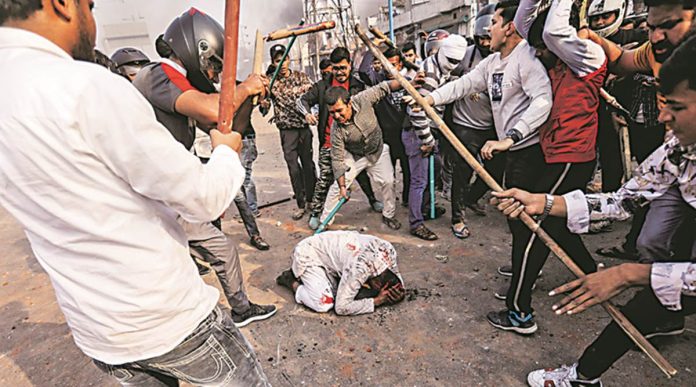In 2021, religious freedom conditions in India significantly worsened. During the year, the Indian government escalated its promotion and enforcement of policies—including those promoting a Hindu-nationalist agenda—that negatively affect Muslims, Christians, Sikhs, Dalits, and other religious minorities, the latest report US Commission on International Religious Freedom noted.
Castigating the Indian Government for its support to the right wing Hindu ideology, the report said, the government continued to systemize its ideological vision of a Hindu state at both the national and state levels through the use of both existing and new laws and structural changes hostile to the country’s religious minorities.
The annual report also noted that in 2021, the Indian government repressed critical voices— especially religious minorities and those reporting on and advocating for them—through harassment, investigation, detention, and prosecution under laws such as the Unlawful Activities Prevention Act (UAPA) and the Sedition Law. The UAPA and Sedition Law have been invoked to create an increasing climate of intimidation and fear in an effort to silence anyone speaking out against the government.
Father Stan Swamy, an 84-year-old Jesuit priest and longtime human rights defender of Adivasis, Dalits, and other marginalized communities, was arrested on dubious UAPA charges in October 2020 and never tried. He died in custody in July 2021 despite repeated concerns raised about his health, it said.
Making a special reference to the arrest of Kashmiri activist, the report noted that the government arrested, filed complaints against, and launched criminal investigations into journalists and human rights advocates documenting religious persecution and violence, including Khurram Parvez, a prominent Muslim human rights advocate who has reported on abuses in Jammu Kashmir.
The government also broadly targeted individuals documenting or sharing information about violence against Muslims, Christians, and other religious minorities; as one example, UAPA complaints were filed against individuals for tweeting about attacks on mosques in Tripura, it noted.
In September, the United Nations (UN) High Commissioner for Human Rights stated that the “ongoing use of the [UAPA] throughout India is worrying, with [the Muslim-majority state of] Jammu Kashmir having among the highest number of cases in the country.”
The report also stated that the Indian government erected hurdles against the licensure and receipt of international funding by religious and charitable nongovernmental organizations (NGOs) under the Foreign Contribution (Regulation) Act (FCRA), significantly impacting religious communities. Numerous groups that document religious freedom violations or aid marginalized religious communities have been forced to shut down operations in the country given the restrictions under FCRA that regulate access to and reporting on foreign funds and prohibit their receipt for any activities purportedly “detrimental to the national interest.”
At the close of 2021, the “licenses of nearly 6,000 organizations, including religious and humanitarian organizations such as Missionaries of Charity and Oxfam India, were not renewed under the FCRA (after an outcry, Missionaries of Charity’s license was renewed in January 2022).”
Government action, including the “continued enforcement of anti-conversion laws against non-Hindus”, has created a culture of impunity for nationwide campaigns of threats and violence by mobs and vigilante groups, including against Muslims and Christians accused of conversion activities. Anti-conversion laws have increasingly focused on interfaith relationships, the 2022 report on religious Freedom noted.
Existing laws in approximately one-third of India’s 28 states limit or prohibit religious conversion. Since 2018 (and continuing in 2021), multiple states have introduced and enacted laws or revised existing anti-conversion laws to target and/or criminalize interfaith marriages.
The report accused the authorities of having “assisted”, if not encouraged, the targeting by non-state actors of interfaith couples, converts, their families, and their religious communities in an effort to prevent interfaith marriages.
National, state, and local governments demonized and attacked the conversion of Hindus to Christianity or Islam. “In October 2021, ” the report added, “Karnataka’s government ordered a survey of churches and priests in the state and authorized police to conduct a door-to-door inspection to find Hindus who have converted to Christianity.”
Making a referenve to Yogi Adityanath, the report noted that, “In June 2021, Yogi Adityanath, chief minister of Uttar Pradesh, warned that he would invoke the National Security Act, which allows for the detention of anyone acting in any manner that threatens the security of state, and that he would also deploy a team of over 500 officials to counter those (including, by his account, children) who were carrying out conversion activities.”
India is the world’s most populous democracy, the report said, adding, “with an estimated population exceeding 1.3 billion, 79.8 percent of whom are Hindu, 14.2 percent Muslim, 2.3 percent Christian, and 1.7 percent Sikh. Smaller religious groups include Buddhists, Jains, Baha’is, Jews, Zoroastrians (Parsis), and nonreligious persons.”
India’s constitution establishes the nation as secular and a democratic republic, and Article 25 of the constitution grants all individuals freedom of conscience, including the right to practice, profess, and propagate religion, it added.
The Indian government has been led since 2014 by the Bharatiya Janata Party (BJP). The BJP-led government, leaders at the national, state, and local levels, and increasingly emboldened Hindu-nationalist groups have advocated, instituted, and enforced sectarian policies seeking to establish India as an overtly Hindu state, contrary to India’s secular foundation and at grave danger to India’s religious minorities, it concluded.
